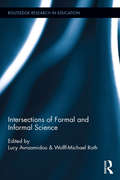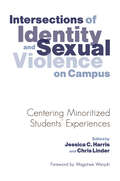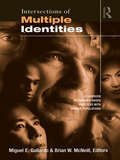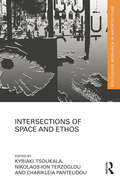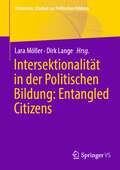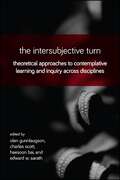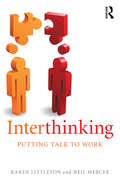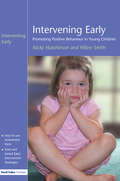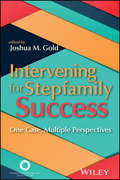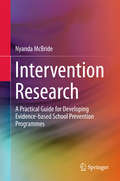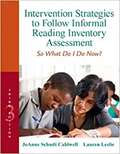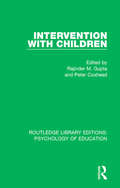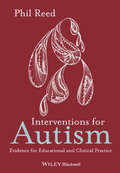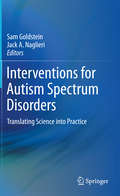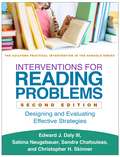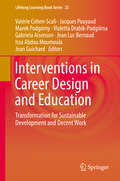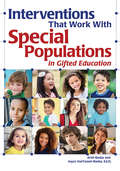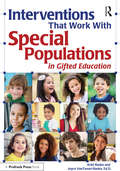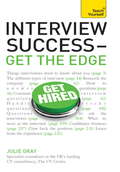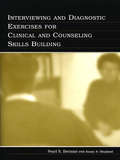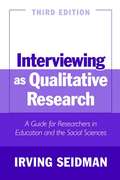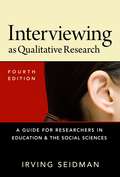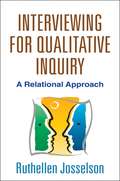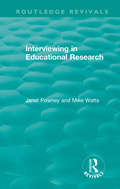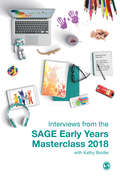- Table View
- List View
Intersections of Formal and Informal Science (Routledge Research in Education #165)
by Wolff-Michael Roth Lucy AvraamidouScience learning that takes place between and at the intersections of formal and informal science environments has not been systematically reviewed to offer a comprehensive understanding of the existing knowledge base. Bringing together theory and research, this volume describes the various ways in which learning science in various settings has been conceptualized as well as empirical evidence to illustrate how science learning in these settings can be supported.
Intersections of Identity and Sexual Violence on Campus: Centering Minoritized Students' Experiences
by Jessica C. Harris Chris LinderWhile sexual violence has been present and prevalent on campus for decades, the work of recent college student activists has made it an issue of major societal and institutional concern. This book makes an important contribution to and provides a foundation for better contextualizing and understanding sexual violence. Each chapter in this edited volume focuses on populations that are not often centered in the discourse of campus sexual violence and accounts for individuals' intersecting identities and how they interlock with larger systems of domination. Challenging dominant ideologies concerning assumptions of white women as the only victims-survivors, the racialization of aggressors, and the deleterious rape myths present in both research and practice, this book draws attention to the complexities of sexual violence on the college campus by highlighting populations that are frequently invisible in research, reporting, and practice. The book places sexual violence on campus in a historical context, centering the experiences of populations relegated to the margins, and highlighting the relationship between racism, classism, homophobia, transphobia, and other forms of domination to sexual violence. The final chapters of the book explore how critical models of intervention and prevention and a critical analysis of existing institutional policies may be implemented across college campuses to better address sexual violence for multiple populations and identities in higher education. This book will expand educators’ understanding of sexual violence to inform more effective policies, procedures, practice, and research that reaches beyond preventing sexual violence and addresses the dominant systems from which sexual violence stems, in an attempt to eradicate, not just prevent, the act and the issue.
Intersections of Multiple Identities: A Casebook of Evidence-Based Practices with Diverse Populations (Counseling and Psychotherapy)
by Miguel E. Gallardo Brian W. McNeill EditorsOver the past two decades, there has been an increase in the need to prepare and train mental health personnel in working with diverse populations. In order to fully understand individuals from different cultures and ethnic backgrounds, practitioners need to begin to examine, conceptualize, and treat individuals according to the multiple ways in which they identify themselves. The purpose of this casebook is to bridge the gap between the current practice of counseling with the newest theories and research on working with diverse clientele. Each chapter is written by leading experts in the field of multicultural counseling and includes a case presentation with a detailed analysis of each session, a discussion of their theoretical orientation and how they have modified it to provide more culturally appropriate treatment, and an explanation of how their own dimensions of diversity and worldviews enhance or potentially impede treatment. This text is a significant contribution to the evolving area of multicultural counseling and will be a valuable resource to mental health practitioners working with diverse populations.
Intersections of Space and Ethos (Routledge Research in Architecture)
by Kyriaki Tsoukala Nikolaos-Ion Terzoglou Charikleia PantelidouThe pressing economic, environmental and social crises emanate the need for a redefinition of the dominant views, perspectives and values in the field of architecture. The intellectual production of the last two decades has witnessed an impressive number of new design techniques and conceptual displacements reflecting the dynamic and fluid relation between man and his dwelling space. However, the contemporary market forces are favouring the growth of a star-system in architectural production based on technological innovation, spectacular imagery and formal acrobatics, and are neglecting the social, environmental and moral implications of spatial design. Perhaps the time has come to think anew the possible critical intersections between space and ethos, not only as an answer to the negative consequences of Modernity, but also as a remedy to the negative aspects of globalisation. The aim of the present collective volume is to enliven the ethical dimensions and dilemmas of architecture as they are shaped within the complexity of our times on two levels: the level of critical and reflective discourse and the level of social and cultural reality occasioned by post-industrial modes of production and new technologies. Thirteen distinguished academics and researchers investigate the complex relations between architecture, space and ethics from divergent and inter-disciplinary perspectives: philosophy, sociology, the humanities, the arts, landscape design, environmental design, urban design and architectural history and theory.
Intersektionalität in der Politischen Bildung: Entangled Citizens (Citizenship. Studien zur Politischen Bildung)
by Dirk Lange Lara MöllerDieser Sammelband widmet sich dem Schwerpunktthema Intersektionalität und den damit verbundenen Impulsen, Anregungen und Schlussfolgerungen für die Politische Bildung. Der Begriff der Intersektionalität erlaubt es dabei, eine subjektbezogene und lebensnahe Perspektive zu berücksichtigen. Die Beiträge des Sammelbandes diskutieren, wie in einer subjektbezogenen Politischen Bildungsarbeit existierende Interdependenzen und Überschneidungen verschiedener Diskriminierungsformen in der Gesellschaft erfasst werden können. Der Band will dazu beitragen, die didaktischen Potenziale unterschiedlicher Forschungshintergründe vorzustellen und damit verbunden theoretische Überlegungen und empirische Erkenntnisse zum Thema Intersektionalität in der Politischen Bildung zu präsentieren.
The Intersubjective Turn: Theoretical Approaches to Contemplative Learning and Inquiry across Disciplines
by Olen Gunnlaugson; Charles Scott; Heesoon Bai; Edward W. SarathA first of its kind, this book maps out current academic approaches in higher education to second-person contemplative education, which addresses contemplative experience from an intersubjective perspective. Until recently, contemplative studies has emphasized a predominantly first-person standpoint, but the expansion and embrace of second-person methods provides a distinctive learning context in which collective wisdom and shared learning can begin to emerge from dialogue among students and groups in the classroom. The contributors to this volume, leading researchers and practitioners from a variety of institutions and departments, examine the theoretical and philosophical foundations of second-person contemplative approaches to instruction, pedagogy, and curricula across various scholarly disciplines.
Interthinking: Putting Talk To Work
by Neil Mercer Karen LittletonThrough using spoken language, people are able to think creatively and productively together. This ability to ‘interthink’ is an important product of our evolutionary history that is just as important for our survival today. Many kinds of work activity depend on the success of groups or teams finding joint solutions to problems. Creative achievement is rarely the product of solitary endeavour, but of people working within a collective enterprise. Written in an accessible and jargon-free style, Interthinking: putting talk to work explores the growing body of work on how people think creatively and productively together. Challenging purely individualistic accounts of human evolution and cognition, its internationally acclaimed authors provide analyses of real-life examples of collective thinking in everyday settings including workplaces, schools, rehearsal spaces and online environments. The authors use socio-cultural psychology to explain the processes involved in interthinking, to explore its creative power, but also to understand why collective thinking isn’t always productive or successful. With this knowledge we can maximise the constructive benefits of our ability to interthink, and understand the best ways in which we can help young people to develop, nurture and value that capability. This book will be of great interest to academic researchers, postgraduates and undergraduates on Education and Psychology courses and to practicing teachers. It will also appeal to anyone with an interest in language, creativity and the role of psychology in everyday life.
Intervening Early: Promoting Positive Behaviour in Young Children
by Nicky Hutchinson Hilary SmithWhen the behaviour of young children causes concern, practitioners often find it difficult to identify exactly what the child’s needs are or how to focus their support most effectively. This book helps meet this challenge. Its inclusive approach seeks to promote positive behaviour in all children. The book includes: a straightforward assessment process to identify children who need additional support practical strategies to encourage positive behaviour and promote emotional well being informative case studies that show how solutions work in practice. This book is an ideal resource for all early years practitioners working across a variety of settings for young children.
Intervening for Stepfamily Success: One Case, Multiple Perspectives
by Joshua M. GoldThis welcome resource provides concrete examples of how to apply multiple family systems theories and treatment planning to common stepfamily issues. A single stepfamily case study is examined through the lenses of the Adlerian, transgenerational, prescriptive play therapy, structural, cognitive behavior, solution-focused, and narrative models to provide an understanding of the benefits of each approach and how to determine the best fit for a stepfamily’s presenting issues. In addition, each chapter examines ethical concerns specific to counseling stepfamilies, issues of diversity, and current research on stepfamily assessment and therapeutic outcomes. *Requests for digital versions from the ACA can be found on wiley.com. *To request print copies, please visit the ACA website here. *Reproduction requests for material from books published by ACA should be directed to permissions@counseling.org
Intervention Research
by Nyanda McbrideThis book offers a step-by-step guide to intervention research, including the methods and techniques that researchers, higher degree research students and others can use when pursuing intervention research in schools and other settings. Guided by the Intervention Research Framework, it also provides practical information on linking a program developed using a comprehensive, evidence-based approach, to research and evaluation processes. The handbook also illustrates how to select an appropriate research sample for research; how to develop valid and reliable instruments for measuring change, including how to devise appropriate measures for assessing behavioural change; how to recruit and negotiate with schools (and other settings) for research involving young people; how to measure and incorporate measures of fidelity of implementation to understand dose response and behavior change; and how to optimize data collection and dissemination. The development and longitudinal assessment of the multi award-winning School Health and Alcohol Harm Reduction Project (SHAHRP) - the first alcohol harm reduction study to assess the impact of a school-based classroom intervention on alcohol use, alcohol-related behaviors and alcohol-related harm using a harm reduction paradigm - provides a practical example of the intervention research processes described in this handbook.
Intervention Strategies To Follow Informal Reading Inventory Assessment: So What Do I Do Now?
by JoAnne Caldwell Lauren LeslieThis one-of-a-kind book identifies practical reading intervention strategies based on students' informal reading inventory results. Today teachers need valid research-based measures for reading improvement, assessments to determine students' reading abilities, and intervention strategies to guide students back on track. To help teachers connect students' performance and evaluation to instruction, best-selling authors JoAnne Caldwell and Lauren Leslie outline practical intervention strategies that are aligned with any informal reading inventory. Targeting the latest research, this edition includes new student case studies, more writing applications, a focus on teaching with classroom materials, and a new PDToolkit (available either with the book or alone). By identifying intervention strategies based on assessment, the book helps teachers and students address difficulties in word identification, fluency, prior knowledge, and comprehension.
Intervention with Children (Routledge Library Editions: Psychology of Education)
by Rajinder M. Gupta Peter CoxheadEducational psychologists, psychiatrists, social workers, and other professionals are often asked by parents or teachers to intervene when ‘normal’ classroom strategies have failed children in their charge. This title, originally published in 1990, brought together for the first time some of the ‘intervention strategies’ available at the time and offers professionals vital information about the results of each strategy in practice. The contributors, acknowledged experts in their fields, present a critical and objective overview of the range of approaches available and apply them to the areas of poor school attendance, maladaptive behaviour, and poor reading levels. They stress the need to avoid replacing a traditional approach with an intervention strategy whose results are unproven. They also warn that different problems demand different approaches and that the consultant must avoid the dogmatic application of a single approach when the child’s welfare is at risk. The need for consultants to deal sensitively with the professionals they are asked to advise is also emphasized. Teachers may feel, for example, that an educational psychologist is out of touch with the realities of teaching. Above all else, interventions should offer realistic and effective methods of improving children’s lives. Intervention with Children provides in one volume practical, effective, and acceptable strategies for working with children. Educational psychologists, LEA advisers, researchers, and other professionals will still find it a valuable source of ideas and a model of good practice from which to develop their own intervention strategies. Written in a clear and accessible style, it will still be of interest to experienced teachers, social workers, and others involved in the management and care of children.
Interventions for Autism
by Phil ReedProviding a vital link between theory and practice, this unique volume translates the latest research data on the effectiveness of interventions for Autism Spectrum Disorder (ASD) into practical guidance for education professionals working with ASD pupils. Reformulates new research data on interventions for ASD into guidance for professionals, drawing on the author's in-depth academic knowledge and practical experience Offers a comprehensive review of up-to-date evidence on effectiveness across a wide range of interventions for ASD Focuses on environmental factors in understanding ASD rather than outdated 'deficit' approaches, and discusses key issues in education provision such as inclusion
Interventions for Autism Spectrum Disorders
by Jack A. Naglieri Sam GoldsteinChildren are being diagnosed with autism spectrum disorders at a staggering rate--as many as one in 110, according to some studies. To this sobering statistic add the familiar figures of the toddler disengaged from his peers, the middle schooler shunned in the lunchroom, and the adult struggling with social cues on the job, and professionals are faced with a mounting challenge: to assist and support young people with these disorders to ensure their successful transition to adolescence and adulthood. The first volume dedicated solely to its topic, Interventions for Autism Spectrum Disorders provides a comprehensive overview of programs currently in use. Contributors explore programs focusing on long-term outcomes, home- and classroom-based strategies, resilience training for parents, and pharmacological management of symptoms. Background chapters review issues in reliability and validity of interventions and evaluating treatment effectiveness. And an especially cogent chapter discusses the centrality of treatment integrity to best practice. Comprehensive programs and targeted interventions covered include: The Early Start Denver Model for young children.The TEACCH program for children, adults, and families.The Center for Autism and Related Disorders (CARD) and CARD eLearning.PROGress: a program for remediating and expanding social skills.Evidence-based strategies for repetitive behaviors and sensory issues.Self-regulation strategies for students with autism spectrum disorders.Interventions for Autism Spectrum Disorders is an essential resource for researchers, professionals/practitioners, and clinicians in a wide array of fields, including clinical child, school, and developmental psychology; child and adolescent psychiatry; education; rehabilitation medicine/therapy; social work; and pediatrics.
Interventions for Reading Problems, Second Edition
by Christopher H. Skinner Sabina Neugebauer Sandra Chafouleas Edward J. Daly IIIThis user-friendly guide has been thoroughly revised to reflect significant changes in the way schools deliver reading instruction and intervention, especially for students at risk for reading failure. Step-by-step strategies target key areas of literacy development: phonological awareness, fluency, and comprehension. Particular emphasis is placed on scientifically based practices that do not require major curricular change and can be applied with students of varying ages and ability levels. In a large-size format with lay-flat binding for ease of photocopying, the book includes 17 reproducible assessment and instructional tools. Purchasers also get access to a Web page where they can download and print the reproducible materials. New to This Edition: *Chapter on multi-tiered intervention delivery, plus additional discussion in other relevant chapters. *Chapter on interventions for English learners (ELs). *Chapter on vocabulary instruction, intervention, and assessment. *Additional graphing and data-analysis tools. *Coverage of new resources available through federal supports. This book is in The Guilford Practical Intervention in the Schools Series.
Interventions in Career Design and Education: Transformation for Sustainable Development and Decent Work (Lifelong Learning Book Series #23)
by Valérie Cohen-Scali Jacques Pouyaud Marek Podgórny Violetta Drabik-Podgórna Gabriela Aisenson Jean Luc Bernaud Issa Abdou Moumoula Jean GuichardThis book is the product of a series of reflections by career counseling and guidance specialists on a question central to society: "How can career and life design interventions contribute to fair and sustainable development and to the implementation of decent work all over the world? ". This question was formulated by Professor J. Guichard, the director of the UNESCO Chair in Lifelong Guidance and counseling at the University of Wroclaw, Poland. The researchers involved in this Chair’s activities proposed answers which form the chapters of this book. These reflections emphasize the need to focus on the study and implementation of certain central psychological processes which can enable individuals to face the main challenges of our society. The contributions also propose new avenues of intervention for career counseling and guidance. The entire book is the bedrock of a program of research and interventions to be implemented in order that the field of career counseling and guidance plays a key role for individuals who must design their lives in a rapidly changing, and ever more complex context. This book is therefore a major scientific contribution and marks a turning point for researchers and practitioners in career counseling and guidance, and for all professionals who support the self-construction of individuals in the 21st century. "The authors draw on a diverse range of disciplines and research traditions and offer readers a rich array of insights, helping them reflect on how career guidance can be mobilised to serve citizens in a world that is increasingly challenged by complex, seemingly intractable problems. A central, crosscutting concern is the ways in which career guidance can foster well-being by facilitating access to meaningful and fulfilling work in contexts that promote equity, social justice, and dignity for all. While engaging the micro-worlds of individuals, and throwing light on their valiant efforts to design a life that realises their hopes and aspirations, it is a commendable feature of many of these papers that they do not eschew the societal – indeed planetary – stage across which personal dramas are enacted.” Prof. Ronald G. Sultana, Director, Euro-Mediterranean Centre for Educational Research, University of Malta."The primary strengths.....are the authors' capacity to provide forward thinking perspectives on the important issue of sustainable lifelong interventions and career design in its broadest sense. The volume offers depth in a way of thinking that is pertinent to the 21st century and provokes both an in interest in the further study of this domain as well as providing tools and references for novice and experienced researchers and professionals. The book is sure to become a major text in the field." Prof. Maurice Taylor, Faculty of Education, University of Ottawa, Canada
Interventions That Work With Special Populations in Gifted Education
by Ariel Baska Joyce VanTassel-BaskaThis text is for regular classroom teachers who work with special needs learners in their classrooms, and the specialists and administrators who support these populations. Students of poverty, English language learners, and the twice exceptional are often overlooked for services in gifted programs and frequently miss out on opportunities to hone their skills and learn the culture of success. Interventions provided in this book promote talent development in schools, at home, and in the community. This book focuses on both the social-emotional and cognitive needs of these students, and provides templates for long-term planning and goal setting. The text also addresses challenges encountered in working with these students and effective strategies to overcome them.
Interventions That Work With Special Populations in Gifted Education
by Ariel Sloan Baska Joyce VanTassel-BaskaThis text is for regular classroom teachers who work with special needs learners in their classrooms, and the specialists and administrators who support these populations. Students of poverty, English language learners, and the twice-exceptional are often overlooked for services in gifted programs and frequently miss out on opportunities to hone their skills and learn the culture of success. Interventions provided in this book promote talent development in schools, at home, and in the community. This book focuses on both the social-emotional and cognitive needs of these students, and provides templates for long-term planning and goal setting. The text also addresses challenges encountered in working with these students and effective strategies to overcome them.
Interview Success - Get the Edge: Teach Yourself
by Julie GrayAre you facing a crucial interview and don't want to risk losing that job because you lack confidence or you think your interview skills aren't up to scratch? Fiercely practical, this book could be the answer to all your problems. Whether you only have a few hours to prepare or a few weeks, Julie Gray will guide you through all the techniques and strategies you need to give yourself the edge in a competitive market. Areas covered include:- Assessing whether you really want the job- 5 things interviewers want to know about you- Different interview types, including assessments centres- Knowing yourself and what you want- Researching your potential employer- What to expect in the questions- Knowing how to answer- Knowing what you want to ask them- Planning ahead- Getting into the zone: confidence boosters- How to dress, behave and speak- Tricky questions and how to handle them- Clawing back the positive when things don't go to planQuick and easy to use, 'Interview Success' makes it easy to focus on the areas of importance from avoiding clichéd answers to dealing with scary interviewers!
Interviewing and Diagnostic Exercises for Clinical and Counseling Skills Building
by Pearl S. Berman WITH Susan Shopland Susan N. ShoplandThis book, specifically designed to meet the needs of those teaching and learning interviewing and diagnostic skills in clinical, counseling and school psychology, counselor education, and other programs preparing mental health professionals, offers a rich array of practical, hands-on, class- and workshop-tested role-playing and didactic exercises.The authors, who bring to their task a combined 31 years of practice and 24 years of teaching these skills, present 20 complex profiles of a broad range of clients--adults, teens, and children; differing in ethnicity, gender, religion, socioeconomic status, presenting problems, and problem severity. The profiles provide students/trainees with a wealth of information about each client's feelings, thoughts, actions, and relationship patterns on which to draw as they proceed through the different phases of the intake/initial interview, one playing the client and one the interviewer. Each client profile is followed by exercises, which can also be assigned to students not participating in role-playing who have simply read the profile.The profiles are detailed enough to support a focus on whatever interviewing skills an instructor particularly values. However, the exercises highlight attending, asking open and closed questions, engaging in reflective listening, responding to nonverbal behavior, making empathetic comments, summarizing, redirecting, supportively confronting, and commenting on process. The authors' approach to DSM-IV diagnoses encourages students to develop their diagnostic choices from Axis I to Axis V and then thoughtfully review them in reverse order from Axis V to Axis I to ensure that the impacts of individual, situational, and biological factors are all accurately reflected in the final diagnoses. Throughout, the authors emphasize the importance of understanding diversity and respecting the client's perceptions--and of reflecting on the ways in which the interviewer's own identity influences both the process of interviewing and that of diagnosis.Interviewing and Diagnostic Exercises for Clinical and Counseling Skills Building will be welcomed as a invaluable new resource by instructors, students, and trainees alike.
Interviewing as Qualitative Research: A Guide for Researchers in Education and the Social Sciences (3rd edition)
by Irving SeidmanThe third edition of this bestselling resource provides clear, step-by-step guidance for new and experienced interviewers to help them develop, shape, and reflect on interviewing as a qualitative research process.
Interviewing as Qualitative Research: A Guide for Researchers in Education and the Social Sciences 4th Ed
by Irving SeidmanNow in its fourth edition, this popular book provides clear, step-by-step guidance for new and experienced interviewers to develop, shape, and reflect on interviewing as a qualitative research process. Using concrete examples of interviewing techniques to illustrate the issues under discussion, this classic text helps readers to understand the complexities of interviewing and its connections to broader issues of qualitative research. The text includes principles and methods that can be adapted to a range of interviewing approaches.
Interviewing for Qualitative Inquiry: A Relational Approach
by Ruthellen JosselsonEngagingly written, this book builds the reader's skills for conducting in-depth interviews designed to address a particular research question. With an emphasis on the dynamics of the research relationship, Ruthellen Josselson artfully demonstrates the steps of a successful interview. Each step is illustrated with excerpts from interviews on diverse topics. The book describes how to structure interviews effectively, develop questions that elicit meaningful narratives, cultivate skills for empathic listening and responding, avoid common pitfalls, and deal with problems that develop in an interview.Pedagogical features include:*Practice exercises adapted from Josselson's popular workshops.*Annotated examples of "good" and "bad" interviews.*A chapter on interviewing dos and don'ts.*Appendices with interview aids, sample follow-up questions, and a sample consent form.
Interviewing in Educational Research (Routledge Revivals)
by Janet Powney Mike WattsInterviewing is one of the most frequently used research tools in the social sciences, yet its importance as a technique is usually underestimated. As Janet Powney and Mike Watts point out, the practical difficulties of interviewing are often understated, and the theoretical assumptions and implications of conducting interviews can prejudice a researcher’s conclusions. Originally published in 1987, this introductory, practical guide widens the debate about interviewing with discussion and advice on interviewing in different kinds of educational inquiry, ranging from large-scale surveys to research carried out in individual schools. The authors give guidelines for preparing, conducting, reporting and analysing interviews, and discuss the practical and theoretical problems arising from each of these aspects. Examples are taken from six case studies contributed by researchers who have conducted interviews for different purposes and in different ways. Interviewing in Educational Research will be valuable to students and researchers in many fields, not only in educational research, but generally in the social sciences, in medical research, economics, business, social planning and administration.
Interviews from the SAGE Early Years Masterclass 2018
by Kathy BrodieThis special book contains the transcripts of the SAGE Early Years Masterclass 2018 interviews, conducted by Kathy Brodie. The interviewees provide fascinating and thought-provoking insights into the rich area of children's learning and development. Taken together, the interviews cover key areas of Early Years theory and practice. They are presented in the same order as the Masterclass, allowing you to follow as you watch the interviews. David Whitebread, Developmental Psychology and Early Childhood Education Sean MacBlain, Contemporary Childhood Sue Waite, Children Learning Outside the Classroom Lorna Arnott, Digital Technologies and Learning Jackie Musgrave, Supporting Children's Health and Wellbeing Cath Arnold, Involving Parents in their Children's Learning Kathryn Peckham, Developing School Readiness Guy Roberts-Holmes, Doing Your Early Years Research Project Sara Knight, Forest School in Practice Ioanna Palaiologou, The Early Years Foundation Stage Julian Grenier, Successful Ofsted Inspections and team-building Penny Mukherji & Deborah Albon, Research Methods in Early Childhood
